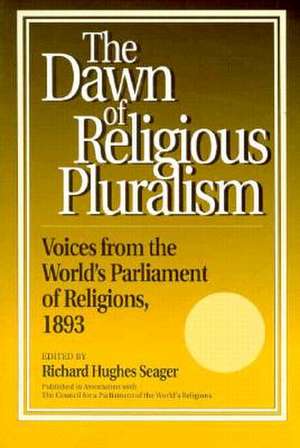Dawn of Religious Pluralism: Voices from the World's Parliament of Religions, 1893
Editat de Richard Hughes Seageren Limba Engleză Paperback – 29 noi 1992
Preț: 174.25 lei
Nou
Puncte Express: 261
Preț estimativ în valută:
33.34€ • 34.91$ • 27.59£
33.34€ • 34.91$ • 27.59£
Carte disponibilă
Livrare economică 15-29 martie
Preluare comenzi: 021 569.72.76
Specificații
ISBN-13: 9780812692235
ISBN-10: 0812692233
Pagini: 502
Ilustrații: 6 line drawings, index
Dimensiuni: 152 x 227 x 35 mm
Greutate: 0.71 kg
Editura: Open Court Publishing Company
ISBN-10: 0812692233
Pagini: 502
Ilustrații: 6 line drawings, index
Dimensiuni: 152 x 227 x 35 mm
Greutate: 0.71 kg
Editura: Open Court Publishing Company
Descriere
On September 11th, 1893, the Columbian Liberty Bell at the World's Columbian Exposition in Chicago sounded ten times, symbolizing what were then considered the ten great religious traditions: Hinduism, Buddhism, Jainism, Zoroastrianism, Taoism, Confucianism, Shintoism, Judaism, Christianity, and Islam. One of the most significant events in American religious and cultural history had begun. The ochre robes of Buddhist ascetics, the vermilion cloaks and turbans of Hindu swamis, the silk vestments of Confucians, Taoists, and Shinto priests, the somber garb of Protestant ministers, all gathered together on the platform around a Roman Catholic cardinal, dressed in scarlet and seated in a high chair of state. The near-ecstatic crowd repeatedly burst into tumultuous applause, waving handkerchiefs, and mingling tears with smiles. Nothing like the World's Parliament of Religions had been seen in the history of the world, and nothing like it was to be seen again for many years: a gathering of representatives of numerous world religions for an exchange of views. It was a turning point in American life, presaging the multiculturalism of a century later. This volume contains a selection of 60 representative and revealing addresses given to the Parliament, with authoritative introductions and notes by Professor Seager. The addresses include contributions by Protestant mainstream ministers, African-Americans, Roman Catholics, Orthodox Christians, Jews, Muslims, Buddhists, Hindus, and representatives of other Asian religions. Also included are various "points of contact and contention, " in which religious leaders attempted to analyze or reach out to their counterparts in other traditions.
